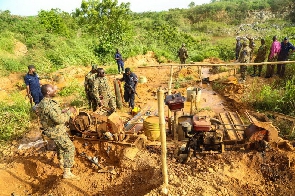 Galamsey has now been more rampant in recent times
Galamsey has now been more rampant in recent times
The United States (US) Department of State, the US Embassy in Ghana and the University of Mines and Technology (UMaT), Tarkwa have assembled key stakeholders in the mining sector to brainstorm technology-based solutions to illegal mining activities in Ghana.
Dubbed: “TechCamp Takoradi,” the three-day workshop is bringing together about 50 stakeholders, including representatives from mining communities and companies, scientists and innovators, policymakers, environmental activists, public health actors and the media.
As part of the workshop, technology experts from across Africa and the United States would analyze the public policy aspects of illegal mining.
They would also devise possible solutions using the latest technologies, including artificial intelligence, remote sensing, geographic information systems, and satellite data and tools made available through projects like SERVIR-West Africa, a joint initiative of the U.S. Agency for International Development and U.S National Aeronautics and Space Administration (NASA).
Mr Kevin Brosnahan, U.S Embassy Public Diplomacy Officer, speaking at the opening of the workshop, in Takoradi, said illegal mining activities in some communities was one of the most challenging and serious threats to Ghana’s environment.
He said the menace had been a major contributor to deforestation, water, air and soil pollution and the devastating farmlands.
“It has also contributed to serious health challenges and an increased number of school dropouts in mining communities, posing challenges to sustainable development,” he added.
Mr Brosnahan indicated that although illegal mining activities affected all Ghanaians, there was no widespread consensus on how best to tackle the issue, adding finding a long-term sustainable solution would require innovative ideas.
“That is why we are pleased to bring international technology experts to help Ghanaian stakeholders find a sustainable path that supports mining communities, while protecting the environment,” he said.
He said the US was committed to strengthening Ghana’s efforts to support sustainable small-scale mining and help to address the environmental impacts of both large and small-scale mining activities.
According to Mr Brosnahan, the U.S Embassy in Ghana had supported numerous projects aimed at enhancing the mining sector in the country including, working with regional development partners to promote mercury-free gold production.
He said the Embassy had provided funding to pilot mercury-free processing technologies and educated miners about business incentives for responsibly sourced gold in Ghana.
“We sponsor capacity-building for law enforcement to crack down on transnational criminal networks in the sector, empower journalists to report on nature crimes such as illegal mining, illegal fishing and wildlife trafficking among others,” he noted.
Professor Richard Amankwah, UMaT Vice-Chancellor, said small scale mining was critical to the socio-economic development of the country in terms of job creation for the teeming youth in that sector.
He, however, noted that the situation where some people mined illegally and irresponsibly was a worry, and that needed commitment from all stakeholders to tackle.
He expressed the hope that participants would provide the appropriate technology-driven solutions that would have positive impacts on the mining industry to help win the fight against illegal mining activities in the country.